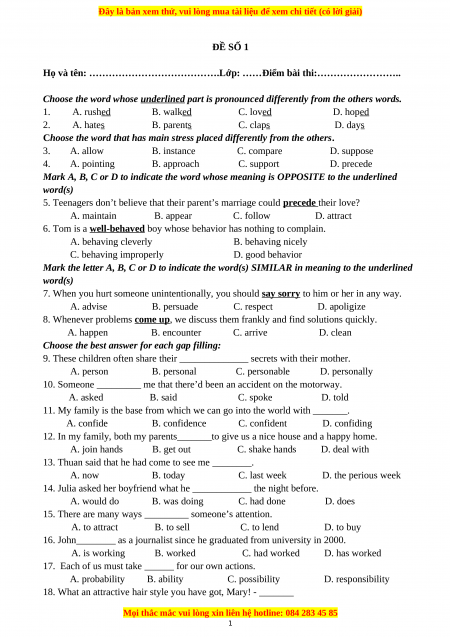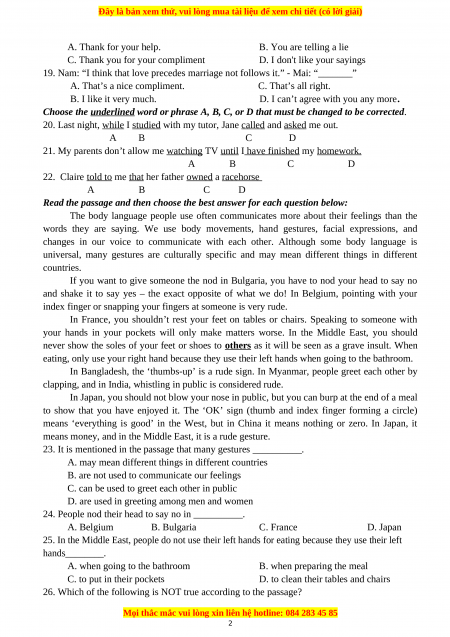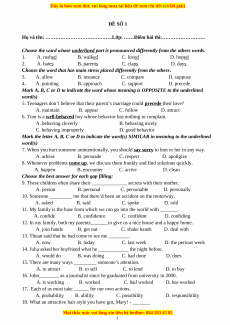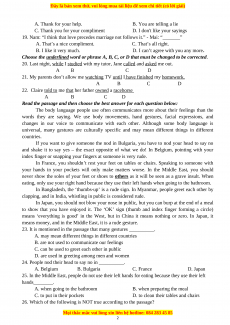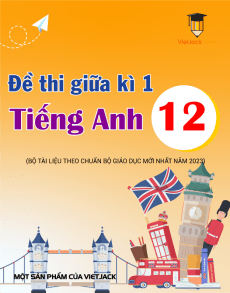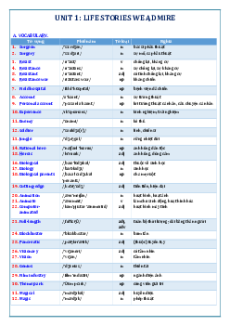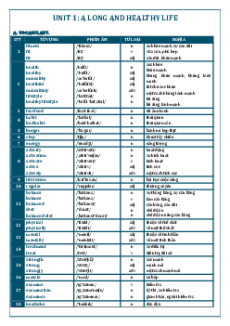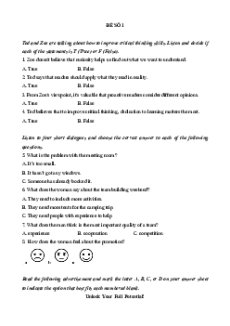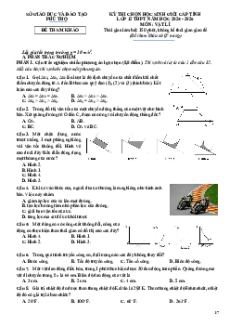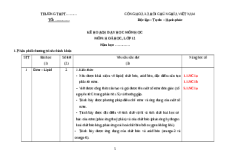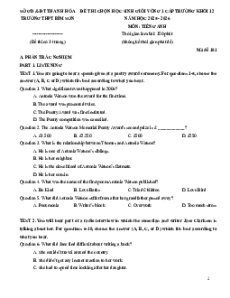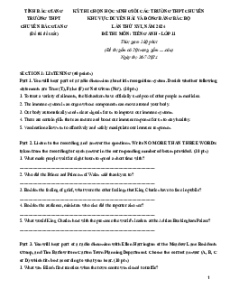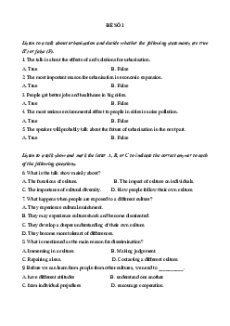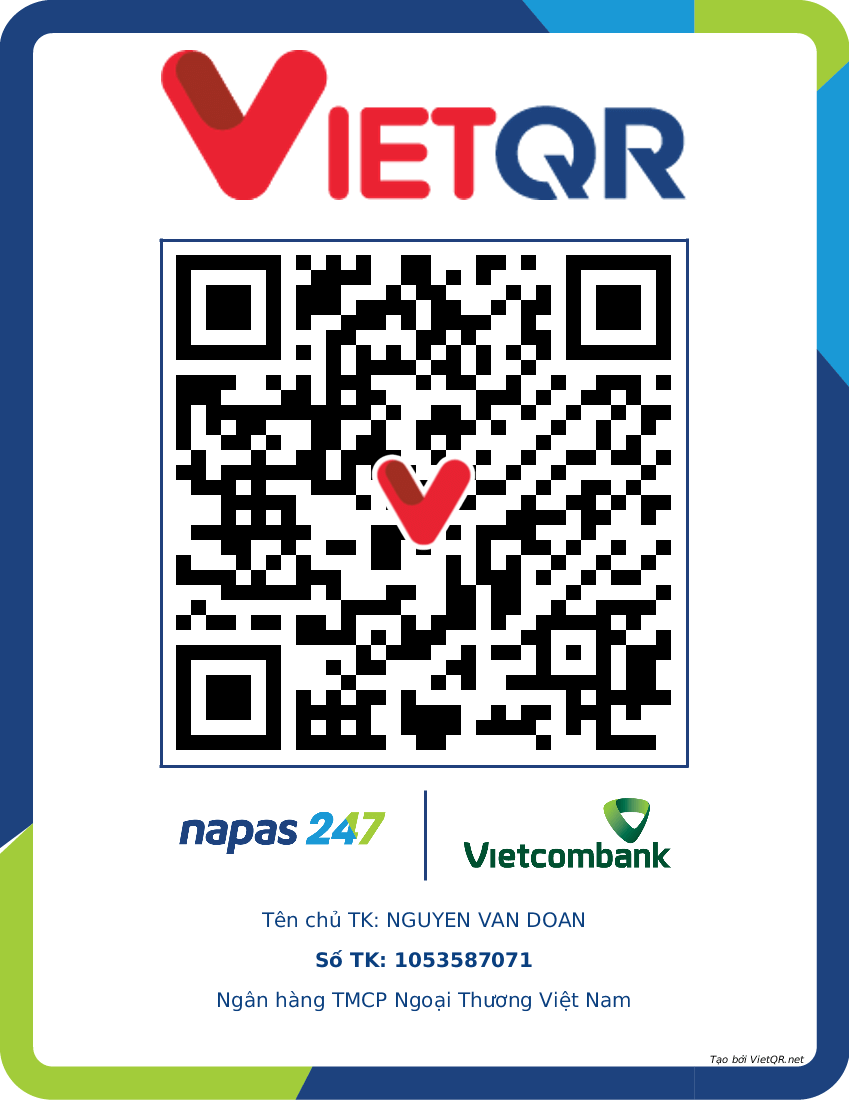ĐỀ SỐ 1
Họ và tên: ………………………………….Lớp: ……Điểm bài thi:……………………..
Choose the word whose underlined part is pronounced differently from the others words. 1. A. rushed B. walked C. loved D. hoped 2. A. hates B. parents C. claps D. days
Choose the word that has main stress placed differently from the others. 3. A. allow B. instance C. compare D. suppose 4. A. pointing B. approach C. support D. precede
Mark A, B, C or D to indicate the word whose meaning is OPPOSITE to the underlined word(s)
5. Teenagers don’t believe that their parent’s marriage could p recede their love? A. maintain B. appear C. follow D. attract
6. Tom is a well-behaved boy whose behavior has nothing to complain. A. behaving cleverly B. behaving nicely C. behaving improperly D. good behavior
Mark the letter A, B, C or D to indicate the word(s) SIMILAR in meaning to the underlined word(s)
7. When you hurt someone unintentionally, you should say sorry to him or her in any way. A. advise B. persuade C. respect D. apoligize
8. Whenever problems come up, we discuss them frankly and find solutions quickly. A. happen
B. encounter C. arrive D. clean
Choose the best answer for each gap filling:
9. These children often share their ______________ secrets with their mother. A. person B. personal C. personable D. personally
10. Someone _________ me that there’d been an accident on the motorway. A. asked B. said C. spoke D. told
11. My family is the base from which we can go into the world with _______. A. confide B. confidence C. confident D. confiding
12. In my family, both my parents_______to give us a nice house and a happy home.
A. join hands B. get out C. shake hands D. deal with
13. Thuan said that he had come to see me ________. A. now B. today
C. last week D. the perious week
14. Julia asked her boyfriend what he ____________ the night before. A. would do B. was doing C. had done D. does
15. There are many ways _________ someone’s attention. A. to attract B. to sell C. to lend D. to buy
16. John________ as a journalist since he graduated from university in 2000. A. is working B. worked C. had worked D. has worked
17. Each of us must take ______ for our own actions.
A. probability B. ability C. possibility D. responsibility
18. What an attractive hair style you have got, Mary! - _______
1
A. Thank for your help. B. You are telling a lie
C. Thank you for your compliment D. I don't like your sayings
19. Nam: “I think that love precedes marriage not follows it.” - Mai: “_______”
A. That’s a nice compliment. C. That’s all right.
B. I like it very much. D. I can’t agree with you any more.
Choose the underlined word or phrase A, B, C, or D that must be changed to be corrected.
20. Last night, while I studied with my tutor, Jane called and asked me out. A B C D
21. My parents don’t allow me watching TV until I have finished my homework. A B C D
22. Claire told to me that her father owned a racehorse A B C D
Read the passage and then choose the best answer for each question below:
The body language people use often communicates more about their feelings than the
words they are saying. We use body movements, hand gestures, facial expressions, and
changes in our voice to communicate with each other. Although some body language is
universal, many gestures are culturally specific and may mean different things in different countries.
If you want to give someone the nod in Bulgaria, you have to nod your head to say no
and shake it to say yes – the exact opposite of what we do! In Belgium, pointing with your
index finger or snapping your fingers at someone is very rude.
In France, you shouldn’t rest your feet on tables or chairs. Speaking to someone with
your hands in your pockets will only make matters worse. In the Middle East, you should
never show the soles of your feet or shoes to others as it will be seen as a grave insult. When
eating, only use your right hand because they use their left hands when going to the bathroom.
In Bangladesh, the ‘thumbs-up’ is a rude sign. In Myanmar, people greet each other by
clapping, and in India, whistling in public is considered rude.
In Japan, you should not blow your nose in public, but you can burp at the end of a meal
to show that you have enjoyed it. The ‘OK’ sign (thumb and index finger forming a circle)
means ‘everything is good’ in the West, but in China it means nothing or zero. In Japan, it
means money, and in the Middle East, it is a rude gesture.
23. It is mentioned in the passage that many gestures __________.
A. may mean different things in different countries
B. are not used to communicate our feelings
C. can be used to greet each other in public
D. are used in greeting among men and women
24. People nod their head to say no in __________. A. Belgium B. Bulgaria C. France D. Japan
25. In the Middle East, people do not use their left hands for eating because they use their left hands________. A. when going to the bathroom B. when preparing the meal C. to put in their pockets
D. to clean their tables and chairs
26. Which of the following is NOT true according to the passage?
2
A. In France, people shouldn’t rest their feet on tables.
B. In Belgium, snapping your fingers at someone is very rude.
C. In China, the ‘OK’ sign means money
D. In Myanmar, people greet each other by clapping
27. The word “others” in paragraph 3 refers to __________. A. other people B. other shoes C. other soles D. other feet
Read the passage and choose the best answers:
Clothing habits are a matter of personal preference in the United States. Most people are
free to wear whatever they feel comfortable. Business people in large urban areas are likely to
wear suits or dresses, while clothing in rural areas is less (28)_______ Most Americans tend to
dress casually when they are not in formal or business situations.
When eating, most Americans hold a fork in the hand (29)_______they write with. Americans
eat away from home often, and usually they pay their own meals when dining with friends.
When Americans greet one another they often exchange a firm handshake. They may greet
strangers on the street by (30)______ "Hello" or "Good morning". Friends often greet each
other with "How are you?" and (31)_______ "Fine, thanks." Americans do not really give any
other answer to the question "How are you?" (32)__________ it is a way of saying hello.
Except in formal situations, people address each other by their given names once they are acquainted.
28. A. formality B. informality C. formal D. informal 29. A. which B. whom C. whose D. who
30. A. saying B. speaking C. telling D. talking 31. A. say B. tell C. answer D. respond 32. A. although B. because C. when D. if
Rewrite the following sentences to keep the same meaning as the given ones:
33.“How long have you been in love with your darling, Paul?”, asked Jimmy.
=> Jimmy asked______________________________________________________________.
34. “You had better work hard to support your family”. Mary said.
=> Mary advised me__________________________________________________________.
35. Helen said: “I will come to see you next Monday”, said Hellen to me.
=> Helen said that ____________________________________________________________.
36. John said to his friend “It was nice of you to come to see me on this occasion.”
=> John thanked his friend _____________________________________________________. THE END!
3
Document Outline
- Read the passage and choose the best answers:
